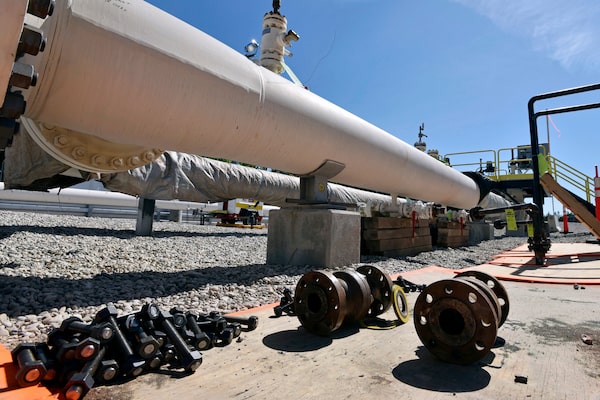
The east leg of the pipeline near St. Ignace, Mich., on June 8, 2017.Dale G. Young/The Associated Press
Calgary-based Enbridge Inc. ENB-T has once again emerged with an incremental victory from a Michigan court, after a judge ruled that the company’s long-running dispute with the state over the Line 5 cross-border pipeline belongs in federal court.
Judge Janet Neff wrote in her ruling Thursday that the “extraordinary circumstances of this case,” the conduct of Michigan and the court’s “regard for comprehensive and efficient administration of justice” demanded that the legal dispute remain in federal court.
The decision is a blow to Michigan Gov. Gretchen Whitmer’s bid to shut down the pipeline, but it echoes a similar ruling Judge Neff made in November about the jurisdiction of the case.
She agreed then with Enbridge that its dispute with Ms. Whitmer’s administration involved “substantial federal issues,” and so belonged in the federal court. She wrote Thursday that it would be “absurd” for the court to “undermine its previous decision,” and perpetuate a state versus federal court battle.
She added that Michigan seemed to be attempting “to gain an unfair advantage through the improper use of judicial machinery.”
The feud began in November, 2020, when, in fulfillment of a campaign pledge, Ms. Whitmer revoked an easement permit granted in 1953 that allowed Line 5 to cross the environmentally sensitive Straits of Mackinac.
At the time, she called the pipeline a “ticking time bomb” and gave Enbridge until May 12, 2021, to comply.
But Enbridge argued that only the federal government can pass judgment on the safety of a pipeline, and that the case therefore belonged in federal court because Line 5 is an important bilateral issue with consequences for both countries.
Michigan countered that the company had violated a rule that moving cases from one court to another must be done within 30 days of an initial filing, but Judge Neff once again rejected that argument.
Enbridge welcomed the decision on Thursday.
“This properly keeps the Michigan attorney-general’s lawsuit in federal court and underscores that the state’s attempts to shut down this critical energy infrastructure raises important federal questions of interstate commerce, exclusive federal jurisdiction over pipeline safety and the serious ramifications for energy security and foreign affairs if the state and the U.S. government were to defy an international treaty with Canada that has been in place since 1977,” the company said in an e-mail.
In October, the Canadian government invoked the 1977 treaty with the United States to trigger formal government-to-government negotiations over the fate of the pipeline, after a breakdown in court-ordered mediation talks between Enbridge and Michigan.
The move escalated a dispute in which U.S. President Joe Biden’s administration had been reluctant to intervene, and was the first time the Transit Pipelines Treaty had been invoked.
Line 5 carries up to 540,000 barrels a day from Alberta and Saskatchewan through two Great Lakes states and re-enters Canada at Sarnia, Ont. It supplies more than 65 per cent of Quebec’s crude oil needs and about 50 per cent of the petroleum Ontario’s refineries use to make gasoline and other fuels.
Proponents, including Canada’s federal government, call Line 5 a vital and indispensable source of energy for Ontario, Quebec and several Midwestern states. But environmental activists fear a ship anchor strike or technical failure could trigger a catastrophe in one of the area’s most important watersheds.
Enbridge said Thursday it looks forward to a prompt resolution of the case in federal court.
With a report from The Canadian Press
Your time is valuable. Have the Top Business Headlines newsletter conveniently delivered to your inbox in the morning or evening. Sign up today.